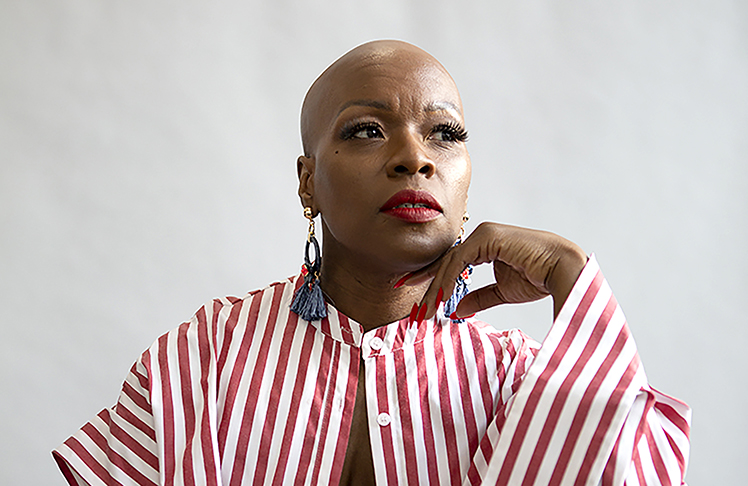
By Aaron Allen, The Seattle Medium
Over the past few weeks, many people around the world have been given a crash course on alopecia. Alopecia areata, also known as spot baldness, is a condition in which hair is lost from some or all areas of the body. Often, it results in a few bald spots on the scalp, each about the size of a coin. Psychological stress and illness are possible factors in bringing on alopecia areata in individuals at risk, but in most cases, there is no obvious trigger, as people are generally otherwise healthy. In a few cases, all the hair on the scalp is lost (alopecia totalis), or all body hair is lost (alopecia universalis), and the loss can be permanent. It is distinctive from pattern hair loss, which is common among males.
Alopecia areata is believed to be an autoimmune disease resulting from a breach in the immune privilege of the hair follicles.
The recent incident at the Oscar’s between Chris Rock, Will Smith and Jada Pinkett-Smith may have shed light on the issue, but the reality is that alopecia is more common than people think and the personal struggles and mental health issues of people living with alopecia is something that we should all be concerned about.
Jamie Elmore, a licensed hairstylist and salon owner in Seattle for over 30 years, knows first-hand the struggles of dealing with alopecia. The founder of a national alopecia support group, Elmore, who was first diagnosed with alopecia in 2004, is currently dealing with the agony of one of her mentees who recently took her own life. The 12-year-old girl from the Midwest had recently found out that she had alopecia and could no longer deal with the stress of being teased and bullied by her fellow students.
Elmore says that hearing the news that one of her mentees had given up on life shook her to the core.
“The mental health aspect should be addressed when it comes to alopecia because in the alopecia community there is a high rate of suicide,” says Elmore. “Just recently we buried one of our babies, 12 years old, the kids were bullying, they were taking off her wig, tormenting this little girl. Within a three-week period, this baby committed suicide.”
Elmore, who discovered her first bald spot in 1998, has turned her struggle into an international movement helping others all over the world inflicted with alopecia, learn the nature of the disease and how to overcome its physical and emotional affects.
“After the birth of my daughter and her herself having health challenges, I didn’t realize the amount of stress going on my life, so in turn my body started responding and I started losing my hair,” recalls Elmore. “Fast-forward and my journey was interesting because I had never seen alopecia before and being a hairstylist, I’d never seen it, never heard of it, until it happened to me.”
“It took a long time for me to accept this,” she continued. “I would say that I began to accept it around 2015 and I would say it still has been a journey. Acceptance to me was accepting the fact that I had lost my hair. Accepting the fact that I did not look like the Jamie I knew. Accepting the fact this was out of my control, accepting the fact that my femininity had been stripped from me.”
Since the time of her acceptance, Elmore has transformed herself from being a potential victim into a nationwide advocate and has used her personal story and leadership to enlighten and enrich the lives of those suffering from alopecia. She started a magazine, Bald Life, to tell the stories of people overcoming the mental struggles of having alopecia and to celebrate the inner and outer beauty of women who have lost their hair. She also founded the Bald Boss Community to support Men, Women and Children with all forms of alopecia; and the Alopecia Support Group, a non-profit that provides aid, programs and innovative therapeutic methods that are vital in the healing process for survivors who are experiencing Alopecia and/or hair loss.
“Acceptance looks different to so many people,” says Elmore. “But I got to the point where I accepted enough to where I made a decision that I was not going to wear wigs any longer, I was not going to cover up, it was going to be more of a choice, more of an accessory as far as if I chose to wear a hat or a scarf.”
Gabriel Carter, a graphic and brand designer in Baltimore, discovered he had alopecia at a very young age and endured bullying and teasing since the age of seven. But just like Elmore, Carter learned to overcome and transformed the negativity into a leadership role within the alopecia community.
“I remember getting bullied and hearing teachers whisper about me having alopecia,” Carter admits. “I had my group of friends that in their presence I felt safe, but I think that there was this overwhelming anxiety and pressure that at any moment I was under attack, all the time.”
“I know people would stare or people would say things, but it was the exchange of energy that it takes to deal with ignorance sometimes,” he continued. “I could feel as a child always having that weight on you, this weight that you carry, that you can be exposed for or made fun of for, that you have no control over.”
There is no cure for alopecia, but there are treatments and beyond that people inflicted with this illness continue to find ways of coping, adjusting and adapting to the anxieties brought on by alopecia.
According to Chanel Conley, an administrator for the city of Philadelphia who suffers from alopecia, “without empathy and knowledge most people can be unaware of the pain a person may be going through, for example experiencing unexplained baldness or hair loss and as we have witnessed through the Oscars, people can be insensitive around other’s struggles.”
Conley says that she utilized friends and family to first re-introduce herself after discovering her hair loss.
“I went through some stress from a divorce,” says Conley. “At the time, I began discovering my hair loss and learned that I had alopecia. Through my divorce I began counseling and discovered a few things that I needed to address but because of that stress I began experiencing the affects alopecia.
“But to help deal with anxiety of this change, I invited friends and family and had an outcoming party and photoshoot. And by surrounding myself with support I was able to overcome the anxiety and stress that most of us feel when we learn we have contracted this illness and begin to heal,” added Conley.
“Alopecia was my biggest struggle,” says Carter. “Because as I began to address it, I found everyone to be beautiful, as a human being is to be beautiful. But it took me a long time to tell myself that and be able to describe ways in which I saw myself as beautiful to me.”
For people living with alopecia this is a transformative moment. Although Alopecia has been around for a long time, it is a very personal experience to those who have it. With the Oscars putting the preverbal spotlight on the disease, because of the leadership of people like Elmore, Carter and Conley, the public can now be educated on just how this disease truly affects not only the physical aspect but more importantly the psychological and emotional well-being of those inflicted with it.
“We have to change the narrative,” says Elmore. “That we are human, and we must tell our stories because no one knows our stories better than us. If you don’t have a spouse, a child, a friend or relative that has alopecia, get to know someone who does so that the general public can gain empathy for those inflicted.”
Conley agrees and says that without empathy and knowledge most people can be unaware of why a person has become bald or is going bald, and as we have witnessed people can be insensitive towards the struggle that others must endure.
“What is important is knowing,” says Conley. “The more we can educate people about alopecia, the greater sense of empathy can arise from simply learning about it. It is important that we get the word out and share our experiences, particularly for those who may not have a support system. Building a community of support surrounding this illness is of the utmost importance.”















